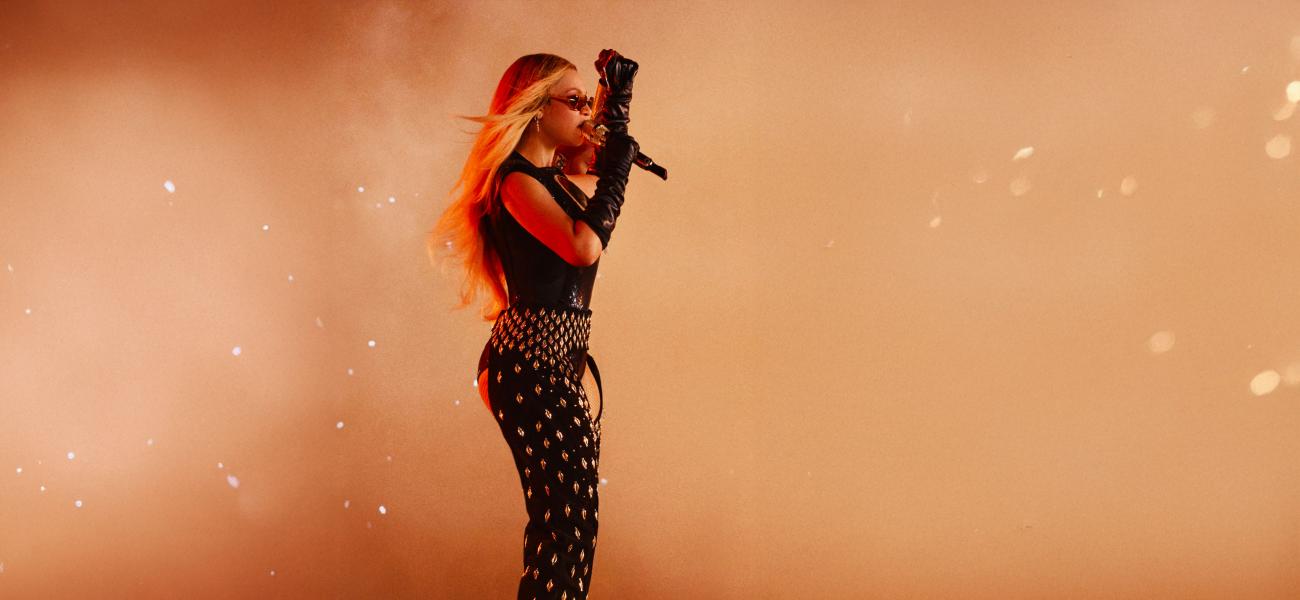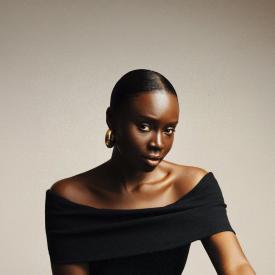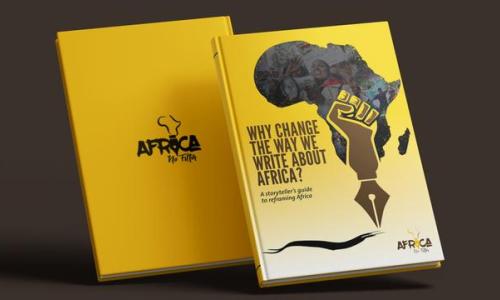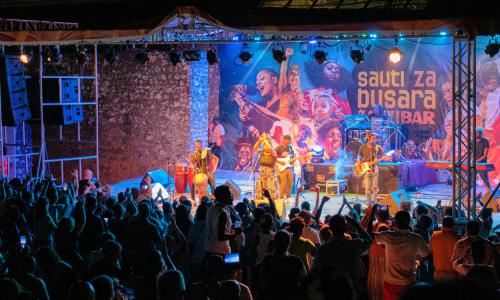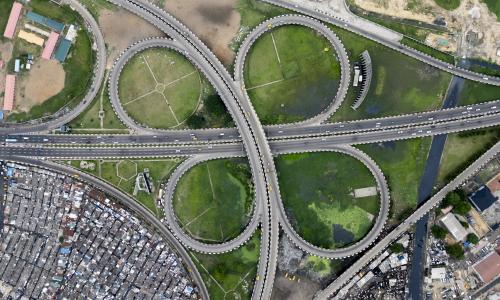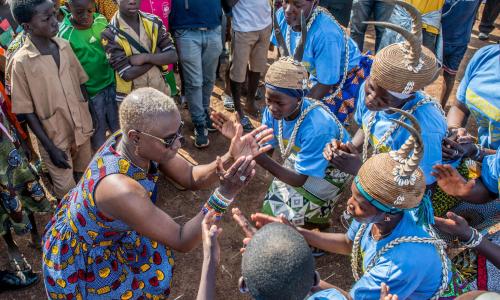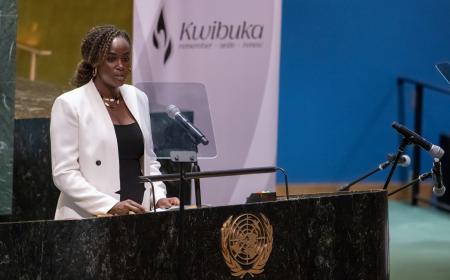Tongoro is a brand that needs no introduction much like the celebrities who have worn its many designs. Singer-songwriters Beyonce Knowles-Carter, and Alicia Keys, as well as supermodel Naomi Campbell, have all been photographed wearing Tongoro signature pieces and accessories. Beyonce’s “Spirit” music video, soundtrack to Disney’s ‘The Lion King’ brought the label to a global audience. The collaboration between Tongoro and the global superstar was cemented during the singer’s Renaissance world tour in 2023, which featured the fashion label’s custom designs.
The creative brain behind this brand is its founder, Sarah Diouf. Diouf launched Tongoro in Dakar in 2016, employing Senegalese tailors, sourcing materials from local markets and centering her storytelling around African culture and identity.
She spoke to Africa Renewal about her vision for Tongoro, African fashion, and the importance of supporting local economies.
Below are excerpts from that interview:
Africa Renewal: How did you first get into fashion?
I have always been into image and motion, and I have always loved media; I first stepped into fashion with my first magazine, Ghubar, an online publication where I wanted to showcase diversity and share African stories. And to translate those stories into visual storytelling, fashion was a great medium to work with.
Around that time, a new wave of African creatives and designers started to emerge, along a new narrative around the continent, especially around African fashion. I started reporting about their work and became more and more interested in what was happening on that landscape. The magazine also granted me access; from attending fashion shows, to meeting and working with prominent fashion figures, it really helped to forge my knowledge of the industry.
Can you explain the balance between traditional motifs in your clothing and more modern styles?
I am highly inspired by the works of African photographers such as Malick Sidibé, Seydou Keïta, Okhai Ojeikere, Samuel Fosso, and the overall aesthetic of Africa post-independence. I love the timelessness of the black and white clichés and how despite being monochrome, these photographs still depict joy, serenity, pride. It also highlights the prints that people were wearing, a lot of batik and Vlisco fabrics, and the ones featured in the decor; it’s very bold, very graphic, and this is where my work around black and white draws from. I also try to tap into different elements, mixing tradition and modernism. There is a silhouette we called Taille basse in Senegal (meaning low-waist in French) and the looks of some of my jumpsuits take after it. The waist is always very cinched, marked, with flare bottoms. I like the idea of flowing, which also takes after this very airy and regal way Senegalese women carry themselves.
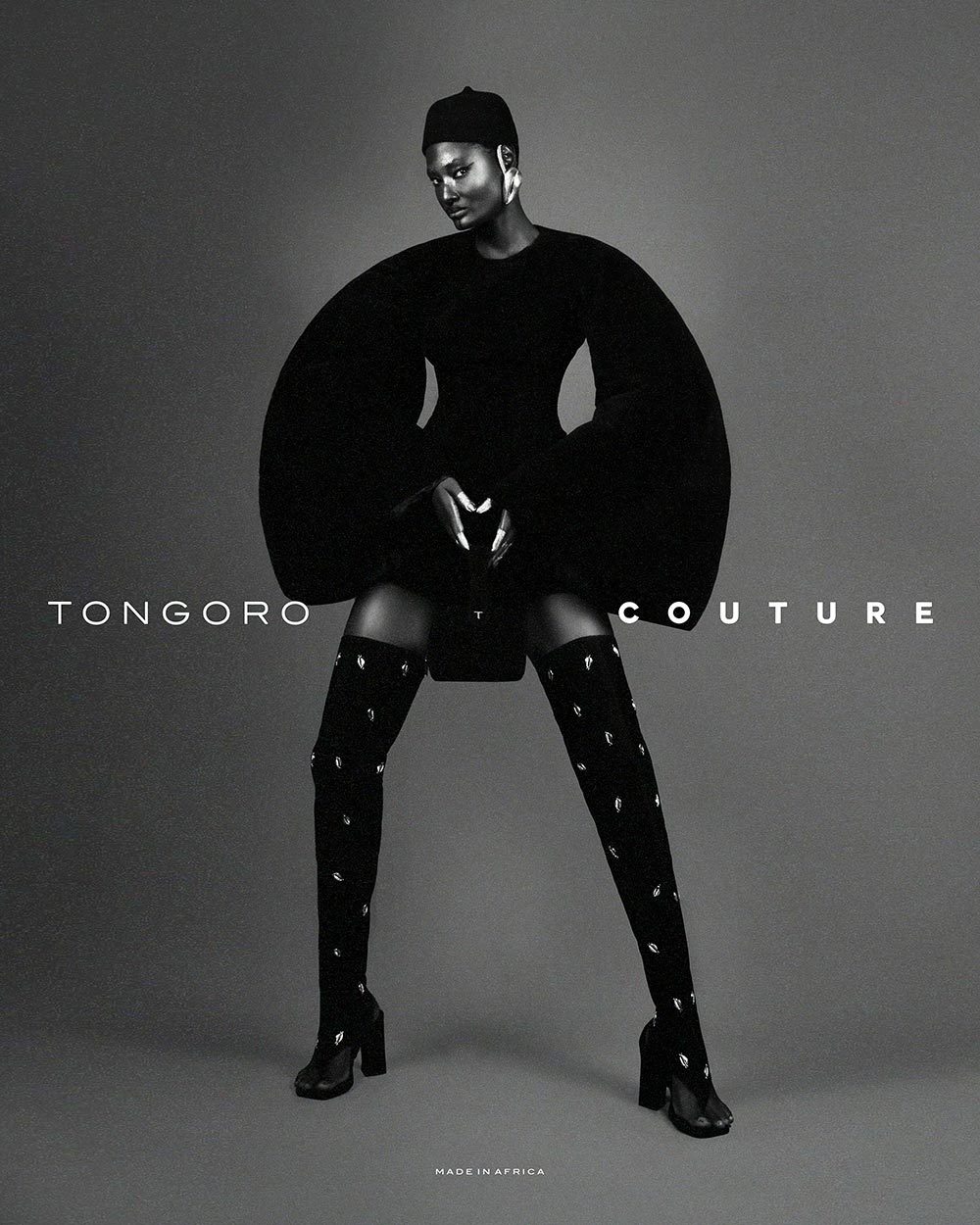
Can you talk about the idea of "Made in Africa"?
African products have long suffered from a poor reputation when it comes to quality, which has affected the overall branding of the continent. We still have a way to go, but I think we also have improved a lot over the past 15 years, which allows us now to proudly enter and compete on the global market.
With ’Made in Africa’, I really wanted to highlight African craftsmanship and the know-how that has been passed down from generation to generation. It is important to show that it is as valuable as the craftsmanship we find in the ateliers of some of the most prestigious European fashion brands we look up to.
I think in a few years, if properly supported by structure and investments, and more brands, the ‘Made in Africa’ label can get as much appreciation and be as reputable, as ‘Made in France’, ‘Made in Italy’, or ‘Made in China’.
For me, it’s about shifting the global perception, and rebranding accordingly.
Why is it important that you source your materials, produce in Africa and work with local tailors?
When I launched Tongoro, I really wanted it to be an authentic African brand, I didn't know exactly how I was going to operate as I was living in Paris prior to making the move, but coming back frequently to Dakar made me reflect on the relationship we have with our tailors, and the habit of buying fabric at the market to get something custom-made, and I thought, ‘if we can do that for one person, we can probably do that at a larger scale.’
When it comes to fabrics, I source everything from the local markets and even though all those fabrics are imported — to me, it is a way of making the production process circular, to provide an income to our fabric suppliers as well. A lot of the local economy is still informal, but it is a way to contribute to it-as an African brand championing the ‘Made in Africa’ it is important to me that Tongoro’s activity impacts the soil where it is produced.
However, there are a lot of challenges that brands like mine meet along the way, so I totally understand those who seek external means of production; I recently came across this open conversation about what makes a brand « African », regarding production location, sourcing, and founder’s identity, and I also think it resides in the ethos and the values that the said brand communicates. Producing locally was something that was dear to my heart. I really wanted to set the first rocks to build upon, because if we don't have people who at least try to do it that way, then maybe that's an industry that we might never develop long term.
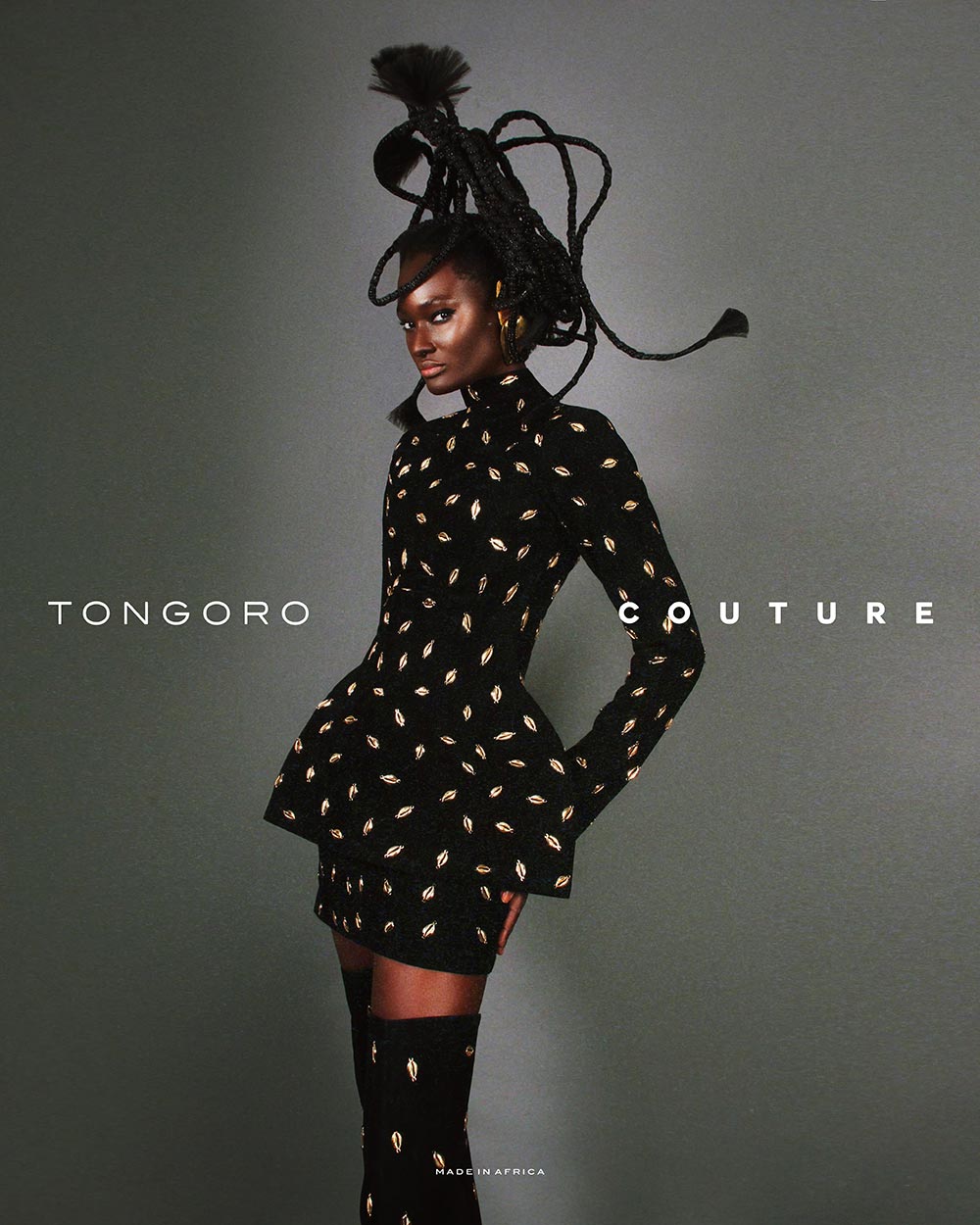
What is your creative process like? How do you gain inspiration in your work?
It really varies and it's never linear. Sometimes I am reading a book and I come across some photography. I also spend a lot of time on the internet, I love perusing archives and old images. I think inspiration comes from everything and everywhere. I can be on the street, and see like a very elegant, Senegalese woman dressed in a very flamboyant way and I'll snap a picture and then go back to that later when I'm in my studio.
So, it really depends. I just try to absorb everything around me and be present, I also watch what's happening in fashion, around textiles, and innovations, but also from the consumer perspective, what people want, what they are looking for, what they are excited about. My personal story, spiritual beliefs, and cultural background also allow me to infuse cultural elements in everything I do.
I recently launched Tongoro Couture, and the starting point was, the cowrie shell or ‘Petaw’ in Wolof; this is something that all over the continent, and across the diaspora, we can recognize and come around, because it is an item that is part of the African and Afro-descendant culture at large. So, I am always trying to tell stories that are going to, gather people and create conversation. I want people to either be able to see themselves in the brand or discover something new.
You have worked with major celebrities such as Beyoncé, Burna Boy, Alicia Keys, Naomi Campbell and more. But you notably dressed Beyoncé for her Renaissance tour. Can you speak about that experience?
It is still very surreal, to be honest because Tongoro was the only African brand on the (Renaissance) tour at the time and I hope more African brands will be embraced in the same way. I mean, Beyonce has been an amazing supporter of the brand since the very beginning. It was a big deal because to be featured amongst all those giants of fashion was a moment of recognition, validation of my work and pride for me. I also think it was celebrated by so many people all across the continent, because it was like « Africa on the stage », you know. So, it was a beautiful moment.
The process itself was very demanding, and I was going through loss at the time which made it even more meaningful; working with someone who has such a strong work ethic and vision for themselves requires a high caliber of execution at all levels. We had to redo her outfit five times to get everything right. It really challenged me in a way that I wasn't expecting and inspired me to push myself beyond my own limitations. It was an incredible experience I will forever be grateful for. The lesson I took from it is that if you really want something, and be with the greats, achieve excellence, you have to push yourself.
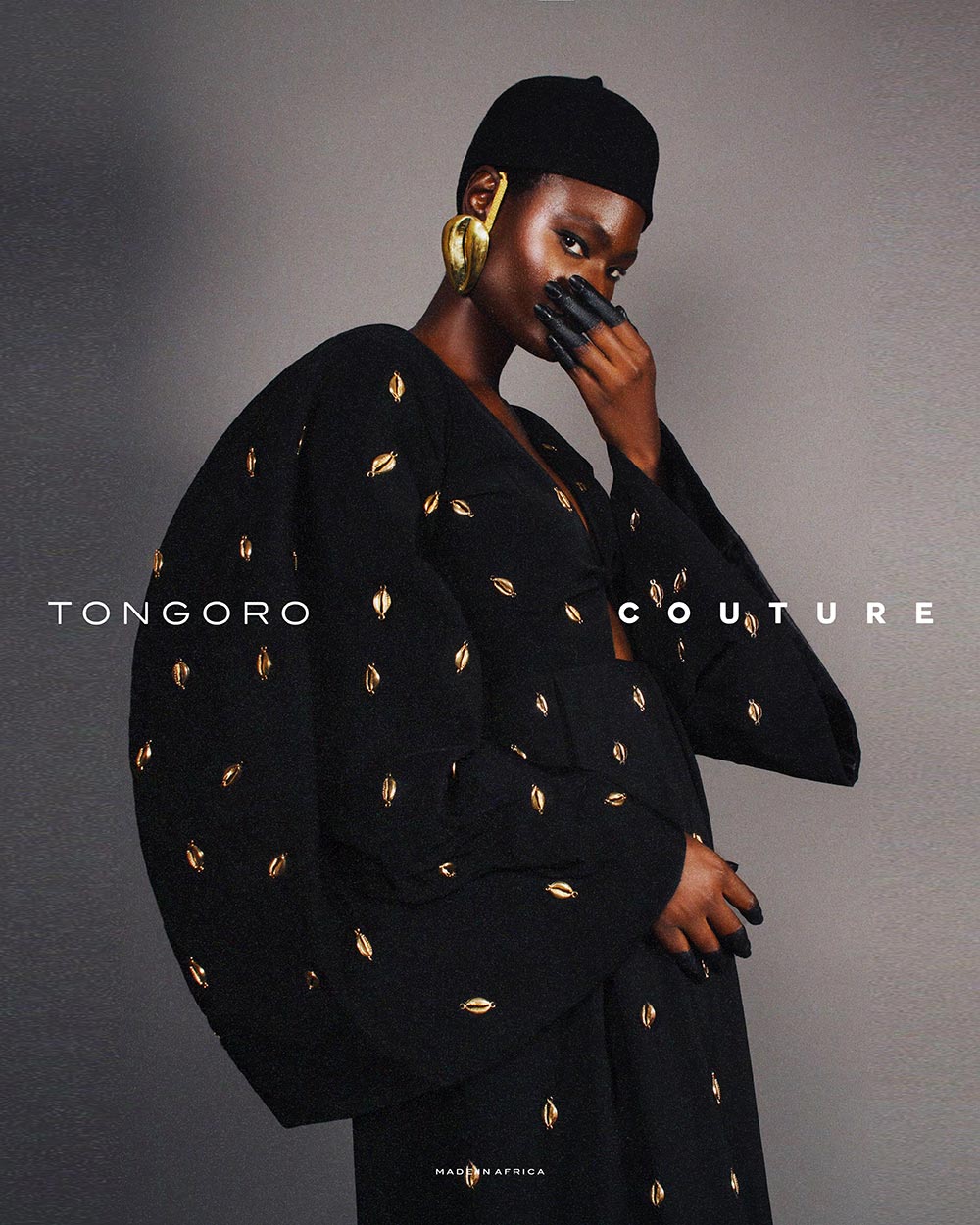
Why is a brand like Tongoro important for young Africans and entrepreneurs to see?
I think it opens conversations about what is possible, about global perception, identity, acceptance, and also the viability of the commercial aspect of an African brand. I'm part of a generation who grew up with the ‘American dream’ in mind, because you see America as this country where everything is possible, where many parents, grandparents, went to seek a better life. I think today, seeing a brand like Tongoro soar, inspires people to understand that the African dream also exists and that it is possible. This is also why it is so important for me to do everything locally, because as hard it is, it is possible. I've done it.
So many people after me, the generation that's going to come, I hope they're going to come and do something even more extraordinary than what I've done.
What do you want to say to the world through your brand as an African woman?
My mother is Central African and Senegalese, and my father is Congolese and Senegalese - I grew up in Ivory Coast. So, you could say I'm a child of Africa from West to Center.
As an African, I really try to embody and communicate pride in everything that I do, and I hope that resonates within my brand, through the communication, the storytelling, and image.
For so long, we've been told our own stories through the lens of someone else, and robbed of our voice, so it's time to reclaim the narrative [and] tell who we are with our full chest.
Obviously, we have a lot of issues to solve as anyone does. Every country, every nation, every culture has its complexities-hence why I think unity and collaboration are vital.
Ultimately, my message is pride; taking pride in who we are, and what we have to offer, because we have so much to offer the world.
